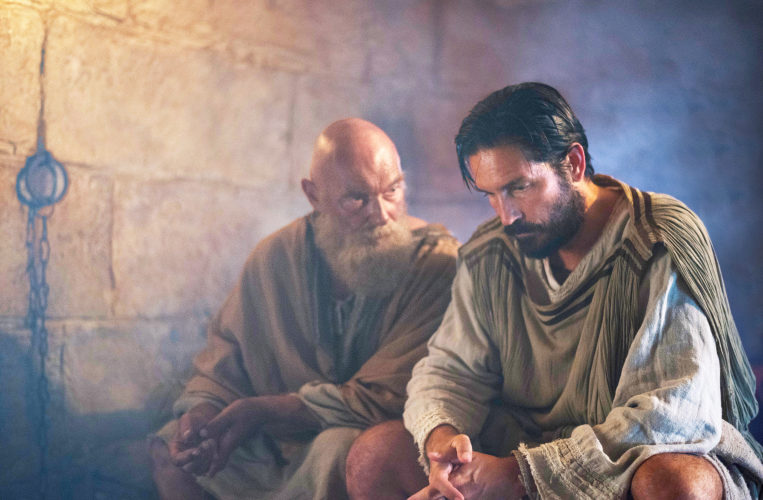Jesus takes great pleasure in upending the status quo.
Extreme hate is overcome by humble love. Selfish sin is transformed by selfless sacrifice.
The greatest persecutor of the early church became the greatest evangelist of the entire world.

The new movie Paul, Apostle of Christ illustrates this in a way we haven’t seen before. It’s obviously difficult to make a compelling movie for Christian audiences that already know the punchline. It’s why faith-based films are often nothing more than a handful of catchphrases we’re supposed to tweet after the movie. Seldom does Christian cinema offer the chance to live in the awkward places of faith, where we have to set our popcorn down because of our dissonance instead of confidently munching away through predictable truisms.
Simply put, this is a movie worth exploring with older teenagers who can navigate the disturbing images of blood, death, and doubt in a brutal onscreen presentation of the First Century. The images are by no means Passion of the Christ: Part Two, but rather an honest portrayal of life amidst death.
For example, Christian kids have learned from Paul that “My grace is sufficient for you” or “Love is patient, love is kind”—but do they know why these things were true, in the context of his story?
Paul focused so much of his energy on Christian living, but how often do we ever stop to ponder why? This film raises questions we all wrestle with but don’t know how to ask. In presenting a narrative with Scripture as its source material and humanity as its medium, we’re treated to answers through questions. It’s reverse psychology at its finest, exploring multiple themes at once:
- Can everyone here be trusted? Multiple characters in the film ask this question, all of them wondering what it means to put their faith in Christ and His people. And we still wrestle with this question today, in light of the stories we hear about church leaders falling and church people backstabbing. What do we do when we don’t have faith in the Church, but we have faith in Jesus… who has faith in the Church?
- Do we stay or do we go? Some would argue that the survival of Christianity hinges on making sure we stay safe and alive. Others believe that Christianity only survives and thrives when it stubbornly stays put as a light in the dark. In a time when families leave churches over silly things (and, sadly, some not-so-silly things) it’s striking to watch the First Century Christians debate this over more significant daily persecution than what most of us experience in a lifetime.
- What is it like to walk with Jesus? There were only so many people in history who saw Jesus in the flesh, but that doesn’t by any means limit us from continuing to see Jesus. As Luke puts it to Paul in the movie: “I’ve never heard or seen Jesus, but the moment I heard you preach [I knew Him, too].” There is power in every person telling the story of Jesus, embedded in their story.
- What happens when we pray but still struggle to have clarity? As one character tells another, “Men do not die for things they doubt.” So what we do when we don’t know what to do? Conviction is more about being “convinced” than having “perfect knowledge”—our heart knowledge of Jesus trumps our head knowledge. It leads to a great side story in the film involving people who believe that “justice” has more to do with retribution than reconciliation. And if we take risks, not knowing exactly the way forward, will God find a way to bless what we’re doing?
- Who is beyond the reach of Jesus? We know the right answer to this: “God’s grace is for everybody.” There is a God who is bigger than us and loves us, and we cannot outrun His mercy. But that includes all of “us.” The hardest people to extend this to are those who hurt us, and keep hurting us. They need to hear this from us: “It is Christ who shatters your defenses and reveals who you are—that you are completely known by Him and completely loved by Him. I pray that moment comes for you soon.”
This is not an easy film to watch, but it is worth watching. It will disturb more than it comforts. As Luke sadly observes to Aquila after watching a fellow Christian suffer and die after being lit on fire: “I did nothing.”
And for that matter, “Who is Aquila?” someone may ask. That’s the other hurdle some may struggle with, in this film. It does have some insider language that may cause people who don’t know the Bible well to feel like they’re watching a historical movie about events they have no reference for. Filling in the details might involve a quick read of Acts 9 before watching the film.
That said, do what you do best. Love students, ask their families if it’s okay to watch this film with them, and then encourage them to change the world as they “taste and see” how the world was changed by the good news of Jesus come to rescue us.
Jesus takes great pleasure in upending the status quo.


